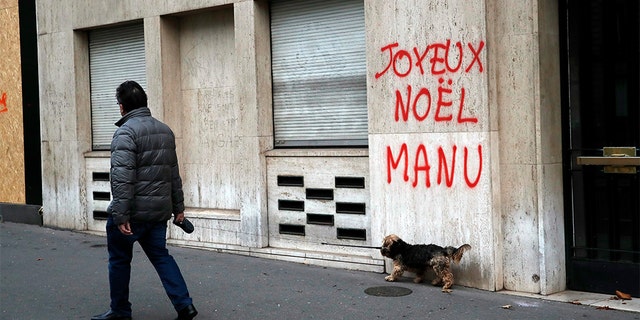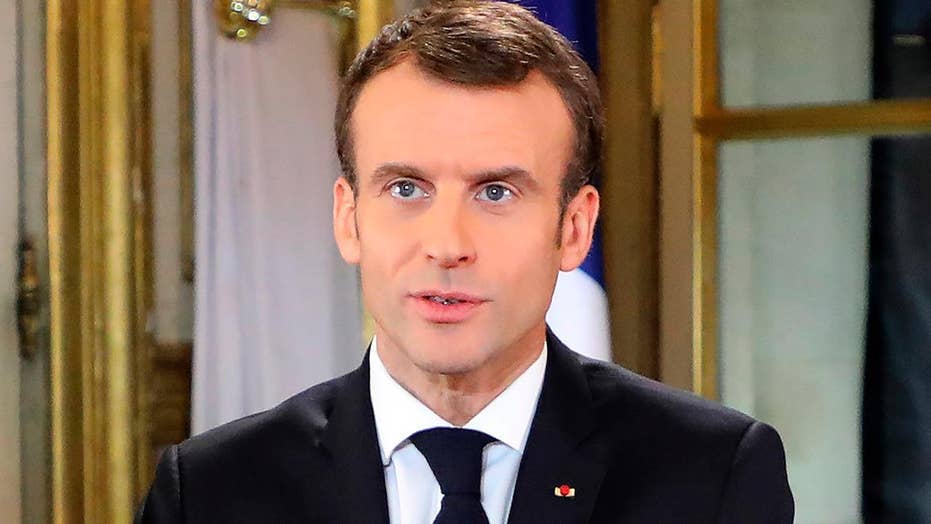Since the first populist protests last month, the long silence of President Emmanuel Macron — who is perceived by many in France as a conceited centrist — aggravated activists’ anger, and it showed no sign of subsiding after his concessions Monday.
Many protesters — who have led four weeks of increasingly radicalized demonstrations — hoped only to hear one thing from Macron: “I quit.”
Benjamin Cauchy, who previously had been reported as a self-proclaimed protest leader, told France 2 TV, as BBC reported: “These are half measures. We feel that Macron has got a lot more to give.”

A man walking his dog past a tag reading: Happy Christmas Manu, referring to French President Emmanuel Macron, in Paris, Sunday. (AP Photo/Christophe Ena)
Even as Macron broke his silence on the protests in a brief televised address, yellow-vested demonstrators vowed to keep up the pressure on a man they see as arrogant, out-of-touch and “president of the rich.”
“It doesn’t solve the problem,” a protester in a yellow vest, Alain Bouche, told BFM television from a yellow-vest roadblock southwest of Paris. He said fellow demonstrators want a national referendum, too.
Some protest representatives have said more demonstrations will be held Saturday, following those in Paris that turned violent during the previous two weekends.
Meanwhile, students opposing changes in key high school tests are calling for a new round of protests Tuesday.
The recent dissent started in neglected provinces to oppose fuel tax increases and progressed to rioting in Paris.
Graffiti scrawled throughout the French capital singles Macron out for criticism, reflecting a national sense that the former investment banker is arrogant and removed from public concerns.
“Macron is there for the rich, not for all the French,” 68-year-old retiree Jean-Pierre Meunuer said at Saturday’s protest in Paris.
Overall, Macron unveiled no radical changes, and clung to his vision for transforming France. Yet his costly promises will make it even more difficult to boost growth — already being hammered by the protests that have damaged holiday retail sales and worried tourists and foreign investors.
“It’s more of a budgetary adjustment than a change of political course,” Cauchy added. “That doesn’t correspond to what the French want.”
With new demonstrations planned for Saturday, some police officers who spent multiple weekends on crowd and riot patrol are calling for their own tax-exempt overtime pay.
Finance Minister Bruno Le Maire said new measures should focus on helping France’s working classes.
“We are ready to make any gesture” that works, he said on RTL radio. “What is important now is to put an end to the crisis and find peace and unity in the country again.”
Fallout from the protests so far could cost France 0.1 percent of gross domestic product in the last quarter of the year, Le Maire warned. “That means fewer jobs, it means less prosperity for the whole country,” he said.
Macron acknowledged he may have given an impression “not to care” about the concerns of ordinary citizens and “might have hurt” some people with his comments. For instance, he wounded many when he told a jobless man he just had to “cross the street” to find work. Or when he told retirees with small pensions to stop complaining. Or when he suggested some French workers are “lazy.”
“We believed in Macron,” Bruno Passe, a retired farmer from the eastern Champagne region, told the Financial Times. “He sold us a dream that he was going to change everything, and now we are fooled.”
OPINION: PROTESTS SHOULD BE LESSON FOR GREEN ACTIVISTS IN U.S.
Before his TV speech, Macron met with local and national politicians and with union and business leaders to hear their concerns — but with no representatives of the scattered, leaderless protest movement.
He showed no signs of giving in during his TV speech. Instead, he defended his political independence and described his devotion to serving France. No French presidential or parliamentary elections are scheduled until 2022.
Protest and street violence has been a central part of France’s political culture — from the Revolution in the late 1700s to the student riots in 1968 — and the “yellow vest” movement reflects this tradition.
The yellow vests worn by the populist protesters have become the symbol of the wave of demonstrations. The protests began in November against a rise in fuel taxes — which Macron retreated from last week — but mushroomed into a plethora of sometimes contradictory demands. Lately, they have included Macron’s resignation.
Macron has appeared determined to continue trying to make the French economy more competitive globally. The middle-of-the-road leader insisted that the protesters’ “malaise” is as old as he is — 40 years — and coincides with France struggling in recent decades to keep up with globalization.
One thing he didn’t do Monday: restore a special tax on households with assets above $1.5 million that he had slashed last year. “Yellow vest” protesters have decried the end of the tax and have demanded it be revived.
STEVE HILTON: THE REAL TAKEAWAY FROM THE FRANCE CHAOS
French media reported 136,000 protesters took to the streets nationwide Saturday, which left widespread damage and tons of debris in the capital and elsewhere.
Macron denounced the protest-associated violence that led to hundreds of injuries, more than 1,000 arrests and the ransacking of stores in some of Paris’ richest neighborhoods.
Authorities will show “no indulgence” to those behind the vandalism and rioting, Macron said, adding that “no anger justifies” attacking police or looting stores.
The Associated Press contributed to this report.






Comments